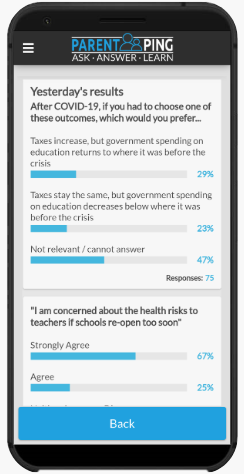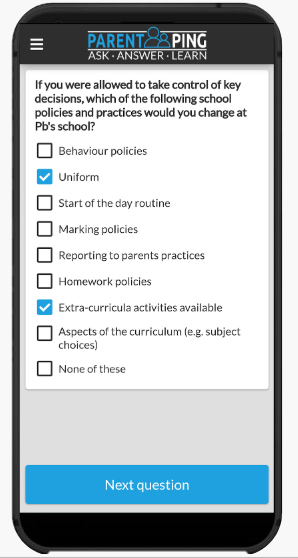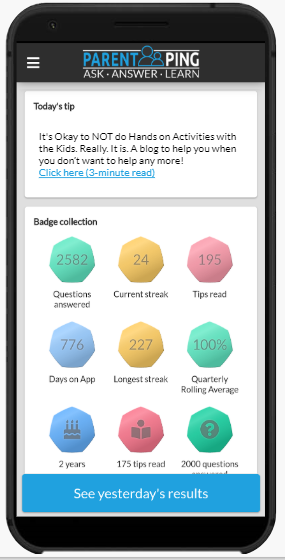We spoke to Big Change project partners Laura McInerney, Alex Weatherall and Karen Wespieser about Parent Ping to find out about their new app for parents and carers.
Adapting the model of their hugely successful app Teacher Tapp, the team hopes to engage and empower parents, creating a full picture of families’ experiences and insights. The information collected will help parents discover what others are doing, how they’re feeling, but also provide valuable data and bring parents into the education conversation.
We find ourselves in a particular moment, times feel uncertain and difficult for many of us. Why is Parent Ping particularly needed and important at this time?
Parents have always had a huge role to play in their children’s education and schooling, but despite this, they rarely have an equal voice when it comes to public discourse about education. Since Covid-19 hit, it’s become increasingly clear that we’re not getting the full picture of how education has been affected by the pandemic by only hearing from teachers.
When we started Teacher Tapp back in 2017, we wanted to find out what was ‘normal’ in schools at the time. Once the crisis hit, we suddenly had a situation where nothing was normal. We were trying to find out what was happening in schools, but instead it was happening at home. Parent groups were stepping forward, making cases for change to government; but they didn’t have the data to give the critical evidence needed.
It became obvious that we needed to make Parent Ping happen as quickly as possible; this crisis wasn’t going to go away but the data was only going to get more and more valuable.
How will the app work?



As a quick overview, parents download the free app, add basic demographic information, and are invited to answer between 2-6 questions daily, taking just two minutes a day.
A question might be to do with the family as a whole, what they think of something as a parent, or it might be about one of their children. Questions won’t be about products like ‘favourite brand of toothpaste’ but they might be about ‘how do you get your child to brush their teeth?’
The app will give a daily tip, a blog written by other parents or experts about aspects of education and life at home, and an opportunity to view the previous day’s results.
How will it benefit parents?
Parenting is a really difficult job. Children don’t turn up with manuals! Parent Ping is trying to help in just a couple of minutes a day, to help parents think about what they’re doing and how they’re feeling. To gather data across a breadth of parents so they can reflect and see what others are doing.
That sense of being asked your opinion, being able to find out what’s normal and get a little bit of information without overloading – that seems to have been missing from this space.
We think the daily tip will be really beneficial to parents too. Particularly for those who are feeling overwhelmed; this is one thing they can try right now, with no one checking and monitoring them.
And what difference will it make to educators and the education system?
Educators will be able to find out how parents are feeling about particular topics, for example the amount of time spent on homework. We hope that being able to share this feedback on a national level will help form better relationships between schools and parents.
We’ll also be sharing the data with organisations to use in their advocacy work, and directly with governments. We saw recently how the data from Teacher Tapp was used in the Education Select Committee hearing into the impact of Covid-19 on school. We want to use parent data in a similar way.
Our ideal world is that when the Department for Work and Pensions or Department for Education is changing a policy that relates to families or children, it would say well, ‘thousands of parents from these groups have told us the situation they’re in,’ and use it to inform decision making. It’s so much more powerful when you’re able to back up with evidence from a broad sample.
We’ll also be able to map some of the data from teachers (via Teacher Tapp) with data from parents; teachers, policy makers and parents will have a holistic view and real insight of education and learning environments.
How are you ensuring the data is as representative as possible?
This is really important to us. We’re going to be working with networks of parents including Parentkind and Learning with Parents to reach a broad range of parents. We’re particularly focused on reaching disadvantaged parents, because they are often underrepresented in media and policymaking,
By asking some demographic questions we can see, for example, whereabouts in the country they’re based, the size of the family, whether the parents are working or not. We need to experiment to work out what these key questions are and build up as big a sample as possible.
We’re aware that there will be some imbalances to start, especially around socioeconomics, but there are also some positives here. For example, on Teacher Tapp, a group that particularly likes and uses the app are men, but in the teaching world they’re actually a small group. We’re hoping that we might attract male users to Parent Ping too, as studies seeking the views of parents have often found men particularly hard to reach.
Finally, what’s the most useful thing people can do to support you?
Share the app once we launch! With your networks, colleagues, family, friends – the key to Parent Ping’s success is getting a large number of users so that the sample is nationally representative.
Big Change is really proud to be supporting the development of Parent Ping. The platform will be launching this summer, sign up to be one of the first users at parentping.co.uk
